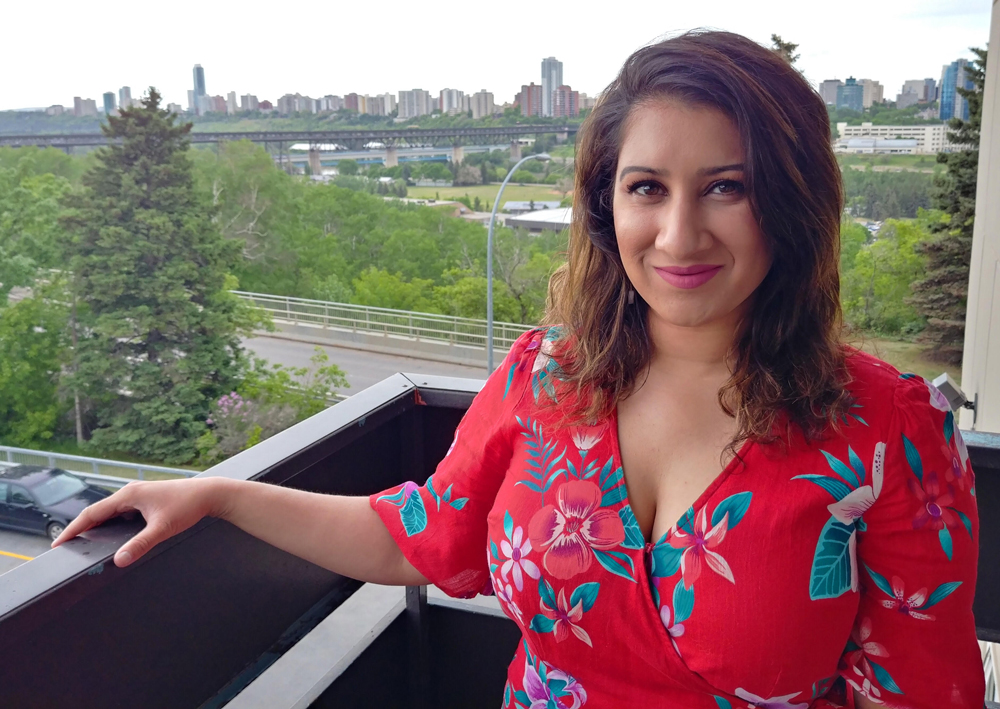
Shama Rangwala's life took her all over the world before she returned to her hometown to pursue a PhD in the Faculty of Arts
Newly minted PhD Shama Rangwala just might be the most interesting person in the room.
Born in Edmonton, Rangwala spent her childhood in the city before moving with her family to an American camp in Dhahran, Saudi Arabia when she was 12 years old so her father could take an engineering post. Two years later, she moved to the U.S. to attend an American boarding school in Deerfield, MA, before heading to England for a year-long international study program.
Finally, she returned to Canada for her next adventure: studying political science at Montreal's McGill University. "I was always interested in politics because I've lived in so many places," she explains. But when the courses didn't grab her, Rangwala looked for a new area of study and found cultural studies - a discipline that focuses on the political dynamics of contemporary culture and is generally housed in English departments.
She was fascinated by the discipline, which allowed her to interrogate the relationship between culture and politics, and unpack systems of oppression that directly affected her as a woman and person of colour. Always academically inclined, she earned both a bachelor and master of arts at McGill before deciding to pursue doctoral studies, following in the footsteps of her father (a U of A professor of chemical engineering), sister (whose PhD is in genetics), and uncle (a former professor of physics at the University of Mumbai).
Rangwala explored PhD programs across Canada and ultimately decided to come to the University of Alberta. "It was the place where I would have the support I needed to do the research I wanted to do," she says. "It wasn't in my plans to come back to Edmonton, but I'm really happy I did."
In 2010, she returned to Edmonton and began her doctoral work in the Department of English and Film Studies, under the supervision of Dr. Michael O'Driscoll (vice-dean of the Faculty of Arts). Everything was going well for Rangwala until she came down with a virus in her second year. While the cold went away, it triggered a rare-but-dangerous autoimmune response called encephalomyelitis, in which the body's immune cells attack the myelin coating of nerve cells (similar to Multiple Sclerosis). The condition can be life-threatening and Rangwala had to be hospitalized for three weeks.
Afterwards, she faced a long recovery period: "There was a lot of nerve pain and I had to re-learn how to walk and things like that." Rangwala took a year off of her studies to allow her body to heal, but also to consider whether her academic path would allow her to do meaningful work in the world. She ultimately decided that she could make a difference as an academic, provided she focused on public engagement. "I feel like there are crises everywhere and I want to offer a perspective that's critical, grounded in history, and rooted in a long period of study," she says.
When Rangwala resumed her program, she began making media appearances on a wide range of cultural issues - from the climate crisis to the abortion bans in the U.S. - becoming a regular commenter on Alberta Primetime. She also founded a blog-style magazine called Pyriscence, which features critical analyses of culture from around the globe. "I wanted to create a venue that's not the fast, hot-take on the mainstream media, but isn't the peer-reviewed process of an academic journal," she says.
She also returned to her research with renewed vigour. Rangwala's dissertation explores how Hollywood adaptations of classic American novels portray economic and political systems as progressive, but actually preserve oppressive ideologies - namely white supremacy, capitalism, and patriarchy. Her research describes a process called "ideological adaptation," in which oppressive systems find new ways to appear progressive with each new generation.
At a time when governments around the world are making sharp right-hand turns and climate crisis is no longer theoretical, Rangwala believes cultural analysis is more important than ever.
"I want to emphasize that doing the work I do is not a luxury or indulgence. I think that having people doing this work - being critical about culture and politics - is really important, especially right now, when we're living in a time of crisis."